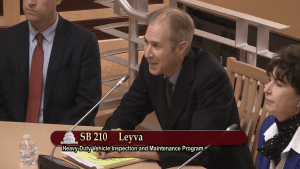Another legislative year has come and gone in Sacramento; and it brought both good and bad news for air quality. Not only did 2019 mark the beginning of a new legislative session with 13 newly elected State Legislators, but it was also the first full year with Governor Gavin Newsom and Senate President Pro Tempore Toni Atkins (who took over the Senate in mid-2018 and previously served as Assembly Speaker.)
Yet, uncertainty abounded despite California’s reputation as a global climate leader. Not only does new leadership mean new priorities, but also potential opportunities to weaken our climate and air quality protections. Plus, California remains locked in battle with the Trump Administration and its polluter-friendly agenda. In short, this was no time to take it easy. Instead, Coalition for Clean Air (CCA) continued the fight for California’s air and climate.
Clean air victories
- SB 210: The biggest win for air quality in 2019 was SB 210 by Senator Connie Leyva. Whereas cars, pickups and SUVs older than eight years old must get smog checked every two years, big rigs and other heavy-duty trucks were exempt. This bill, which CCA has worked on for three years, lays the groundwork for California to create the first-ever maintenance and emissions inspection program for heavy-duty trucks. Under SB 210, the California Air Resources Board (CARB) must develop a pilot program to check heavy-duty truck maintenance and emissions. After the pilot program is complete, CARB will have two years to implement the program across the state. Not only does the final form of the bill ensure the program is funded, but it also has built in accountability measures and affects trucks coming into California as well. According to CARB, between the years 2023 through 2031, the new heavy-duty smog check program will remove 93,000 tons of oxides of nitrogen and 1,600 tons of particulate matter from the air. These emissions reductions are equivalent of taking 145,000 and 375,000 trucks off the roads in California respectively.[1]
- SB 400: There was also good news on the mobility equity front as well, thanks to SB 400 by Senator Umberg and the California Bicycle Coalition. The Clean Cars 4 All program helps income-eligible households in disadvantaged communities retire their old, polluting vehicle and instead purchase a cleaner vehicle or mobility option, such as transit. However, electric bicycles and bike sharing programs were not eligible under the program. Due to SB 400 becoming law, e-bikes and bikeshares will now be an option, providing low-income earners zero-emissions, low-cost options to get around.
- AB 142: While the bulk of California’s air pollution problem is from transportation, toxic emissions from industry also put Californians’ lives at risk. One of the biggest risks to communities are lead emissions from battery recycling. AB 142, by Assembly Member Cristina Garcia, extends the battery recycling fee so that battery manufacturers pay the same $2 per battery fee that consumers pay. Additionally, the bill helped clarify several provisions governing over California’s battery recycling program. By ensuring the battery recycling program is financially stable and effective, AB 142 will help reduce toxic exposure to disadvantaged communities, protecting public health.
Stopping bad bills cold
- AB 1299: The public has the right to know what they’re breathing. For those living near oil refineries, that knowledge is even more important. Under current law, oil refineries must have a fence line emissions monitoring system operational by January 2020. Within the last days of the legislative year, however, AB 1299 by Assemblymember Rudy Salas was gut-and-amended to exempt oil refineries located within or near small communities. Many of these small communities are home to low-income agricultural workers who are often immigrants and people of color. Fortunately, advocates were able to stop this bad bill from being heard this year.
- AB 1424: It goes without saying that charging up an electric car should be just as easy as buying gasoline. Sadly, this isn’t the truth – several EV charger companies use exclusive payment methods and subscription models which make it more difficult for consumers. To help resolve this problem, CARB proposed to require EV chargers to have credit card readers. However, AB 1424 by Assemblymember Marc Berman – a bill sponsored by some EV charger companies, would’ve prevented CARB from creating such a rule. Fortunately, CCA, our allies in the Charge Ahead California campaign and other advocates were able to slow down the bill enough to allow CARB to pass the rule. Ultimately, the bill was defeated in the Senate Appropriations Committee.
Unfortunate vetoes
- SB 1: Disappointingly, a good bill was vetoed by the Governor. SB 1 by Senate President Pro Tempore Toni Atkins would’ve protected California’s air, water and public lands should the Trump Administration roll back Federal standards. Unfortunately, big agricultural companies and Senator Dianne Feinstein opposed the bill because of its water conservation provisions. Despite the threat from the White House, Governor Newsom vetoed the bill.
- SB 127: Another important bill that was vetoed was SB 127 by Senator Scott Wiener. This bill would’ve worked to improve pedestrian and bicyclist safety by requiring “Complete Streets” projects to be included in future highway projects, prioritizing projects in low income communities or communities with mobility challenges. In vetoing the bill, Governor Newson echoed Caltrans and argued this bill was costly and prescriptive. Further, he argued his recently signed Executive Order would achieve the bill’s aims. However, it’s worth noting that the Governor’s Executive Order isn’t specific and doesn’t include specific time frames or deadlines.
This is only a small sampling of what happened in the State Legislature in 2019. And while it’s unfortunate that Governor Newsom vetoed two good bills, clean air did see some major successes this year.
Much of our success fighting for good clean air policies was made possible thanks to people like you, who wrote, called and tweeted your representatives to support or reject priority legislation. Thank you for helping us make a difference! Stay up to date on the latest action alerts by adding your email here.
The whole process will begin again on January 6th – so mark your calendars!
[1] https://inlandempire.us/governor-signs-senator-leyvas-legislation-requiring-smog-checks-for-big-rig-trucks/








